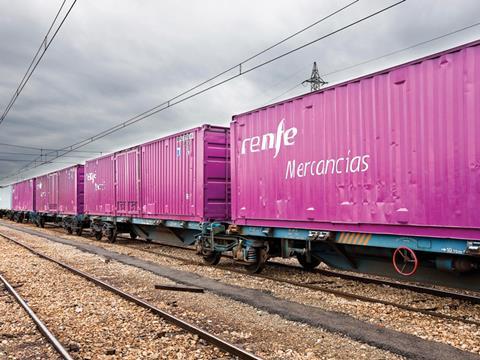
SPAIN: National competition authority CNMC announced on March 6 that it would be imposing fines totalling €75∙6m on freight operators, following an investigation which had revealed anti-competitive practices in breach of Spanish and European Union law. CNMC says that national operator RENFE and various companies within the DB group, together holding over 80% of the Spanish rail freight market, had colluded to maintain the status quo and impede liberalisation of the sector.
According to the authority, RENFE and the DB companies had formed contractual relationships which established themselves as preferred clients and suppliers in traction and other services essential to the provision of rail freight services. RENFE’s only competitor for the provision of traction in the domestic market, DB subsidiary Transfesa, subcontracted this service to RENFE and to another DB subsidiary. For international traffic, CNMC found that DB had not used its own traction, despite having its own locomotive fleet in Spain via Transfesa Rail, and had also subcontracted this to RENFE.
A fine of €49∙9m has been imposed on the national operator’s passenger and freight subsidiaries, RENFE Operadora and RENFE Mercancías. A fine of €10∙5m has been imposed on DB companies Transfesa SA, Transfesa Rail, PIF, Hispanauto, Semat, Deutsche Bahn Ibérica Holding, DB Mobility Logistics AG and DB Schenker Rail Deutschland AG.
RENFE Operadora and RENFE Mercancías have been fined a further €15∙1m in respect of a separate infraction, CNMC having found them to have discriminated against the members of the private rail operators’ association AEFP in the provision of traction for freight services within Spain.
Responding to the announcement, RENFE Mercancías said it would be contesting the fines totalling €65m for the national operator, which according to media reports are the largest ever imposed on a Spanish company. As well as being ‘disproportionate’ for a business with an annual turnover of €215m, the fines were ‘unjust and pointless’, given that the alleged abusive practices dating back to 2008 had been corrected voluntarily.
Appearing before the Development Committee of the lower house of the Spanish parliament, EU Transport Commissioner Violeta Bulc said that the fines were ‘a clear and firm signal that liberalisation is a very important and serious issue which must be respected.’

















